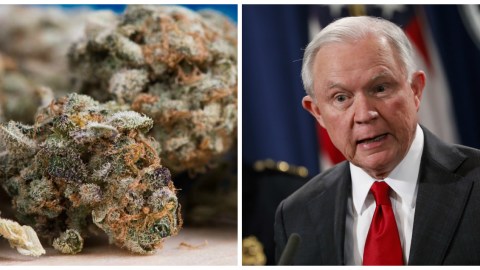Pot stocks soar as Sessions resigns — but will his replacement relax laws?

- Former Attorney General Jeff Sessions resigned on Wednesday. In the following hours, stocks of marijuana companies soared.
- The interim attorney general, Matthew Whitaker, has expressed support for a law that legalizes a non-psychoactive form of cannabis, though it’s unclear where he stands on medicinal or recreational legalization of other forms of the drug.
- Six out of 10 Americans support legalization — up from 3 out 10 in 2000.
It’s been an exceptional week for marijuana. On Tuesday, Missouri and Utah voted to legalize medicinal cannabis, while Michigan became the first Midwestern state, and the tenth in the country, to legalize recreational marijuana.
However, the biggest boost for legalization-minded Americans and the businesses that grow and sell marijuana came on Wednesday when former U.S. Attorney General Jeff Sessions was forced out of office by the person who nominated him, President Donald Trump.
Sessions, a vocal supporter of the war on drugs, had been a thorn in the side of drug law reform advocates and the country’s burgeoning and quasi-legal cannabis industry, which generates upward of $5 billion in annual revenue.
“He’s been an absolute disgrace on drug policy,” Michael Collins, interim director of national affairs for the Drug Policy Alliance, told NBC News.
Sessions made his views on marijuana abundantly clear.
“Good people don’t smoke marijuana,” he said in an April 2016 Senate hearing. “We need grown-ups in charge in Washington to say marijuana is not the kind of thing that ought to be legalized.”
In January, Sessions rolled back Obama-era guidelines that had deprioritized federal agencies’ enforcement of marijuana laws in states where cannabis had been legalized.
So maybe it wasn’t a surprise when stocks of cannabis companies soared in the hours after his resignation on Wednesday. For instance, Nasdaq’s Alternative Harvest Marijuana ETF, a fund that bundles assets for the marijuana industry, shot up 5.6 percent in the hour after Sessions resigned. Similarly, marijuana stocks like Aurora Cannabis Inc., Canopy Growth Corp. and Cronos Group Inc. all saw a boost of at least 8 percent in the hours after the announcement.
Where does the new attorney general stand?
Pot-enthusiasts clearly celebrated Sessions’ resignation. Less certain, however, is where his interim replacement and former chief of staff Matthew Whitaker stands on marijuana policy. In a 2014 primary debate for a Senate seat, Whitaker expressed support for a law that legalized medical cannabidiol (CBD), a non-psychoactive component of cannabis. However, he also voiced concern about states not following federal regulation schemes.
“I think Congress should regulate things that harm people, and that is the hard drugs and the like that dramatically hurt citizens, cause violent crime in our communities,” he said. “Those should be regulated.”
“But not marijuana?” the debate moderator asked.
“For me, I saw the impact of marijuana on our border. And if you go to any of the counties in Texas where there’s an illegal importation of marijuana, there’s a tremendous amount of violence.”
It’s worth noting that the problem of violence in border counties seems to be a result of marijuana’s status as an illegal substance, not a result of people using the drug.
Americans have increasingly expressed support for legalization. A 2018 poll from the Pew Research Center shows 62 percent of Americans believe cannabis should be legalized, up from 31 percent in 2000. In the coming years, the U.S. will get the opportunity to see how legalization works out for Canada, which in October became the world’s second country to fully legalize cannabis.





